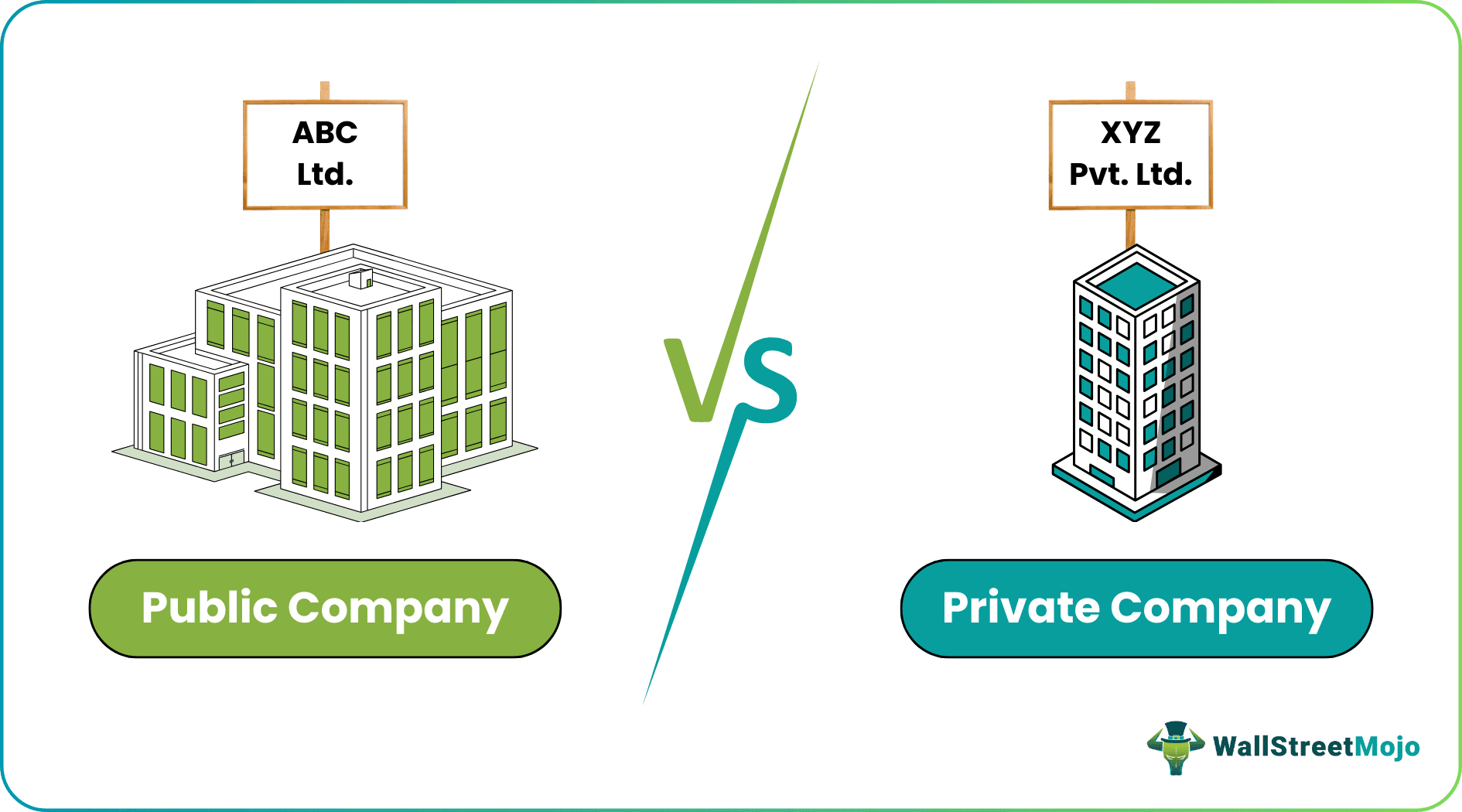Table Of Contents
Differences Between Public Company vs Private Company
Public companies and private companies both can be huge. It is just the way they source funds is different.
- The public company takes the help of the general public and loses out on the ownership, and they need to adhere to the regulations of the SEC.
- The private company takes the help of private investors and Venture Capital. And they do not need to disclose any company information to the general public.

Public Company vs Private Company Infographics
There are many differences between a public company and a private company. Let us have a look at them one by one: -
What is a Public Company?
A public company can sell its registered securities to the general public. After an IPO, a company becomes a public company. A public company can also be termed a publicly-traded company.
A publicly traded company means that it can trade in public capital markets and directly sell its shares to the public. As per the U.S. Securities and Exchange Commission (SEC), if a company has $10 million in assets and over 500 subscribers, the company has to register with SEC and needs to follow all the reporting standards, rules, and regulations.
The shares of a public company are shared by the shareholders, board of directors, and management. A company becomes public to generate more capital for the business public. As a result, they can expand their reach and market.
What is a Private Company?
A private company is not like a public company. For example, a private company cannot trade its shares among the general public. And the shares of private companies are not traded on public stock exchanges.
That does not mean private companies do not have shares, and none can own them. Instead, the shares are held and privately traded by a few willing investors for private companies. A private company is run the same way a public company is run. The only difference is that the shares traded in a private company are relatively smaller, and limited individuals own the traded shares. In the case of private companies, capital often is sourced from venture capitalists. Private companies' investments are perfect for VCs as they look for high-risk, high-reward investments. Private companies can go public if they need more capital to expand their business. They go for Initial Public Offering (IPO) and issue shares to the general public.
A public company can also transform itself into a private company with the help of a private equity firm.
A Comparative Analysis of a Public Company vs Private Company
There are many differences between a public company and a private company. Let us look at the top differences between the two: -
| Points of Differences between Public Company and Private company | Public Company | Private Company |
|---|---|---|
| 1. Definition | A public company can sell its registered shares to the general public. | A private company can sell its own, privately held shares to a few willing investors. |
| 2. Traded on | The stocks of a public company are traded on stock exchanges. | The stocks of a private company are owned and traded by only a few private investors. |
| 3. Regulations | A public company must adhere to many regulations and reporting standards per the SEC. | Until the private companies reach $10 million and more than 500 shareholders, it does not have to follow any regulations issued by the SEC. |
| 4. Advantage | The primary advantage of a publicly-traded company is that it can tap into the market by selling more shares. | The primary advantage of a privately traded company is that it does not need to answer to any stockholders, and there is no need for disclosures. |
| 5. Size | Publicly traded companies are big companies. | Privately traded companies can also be big companies. So, the idea that a privately held company is smaller is utterly false. |
| 6. Source of funds | For the publicly traded company, the source of funds is selling its shares and bonds. | For the privately traded company, the source of funds is a few private investors or venture capitalists. |
Can a private company be a public company shortly or vice versa?
The answer to both of these cases is a resounding yes. A private company can be a public company by conducting an initial public offering (IPO). They can issue shares to the general public.
On the other hand, a public company can transform itself into a private company. It can often happen that the public company wants to remain restricted by a few investors only. To do this, they hire a PE firm. The PE firm buys a major portion of outstanding shares in the company and request the SEC to delist the company from the stock exchange.
